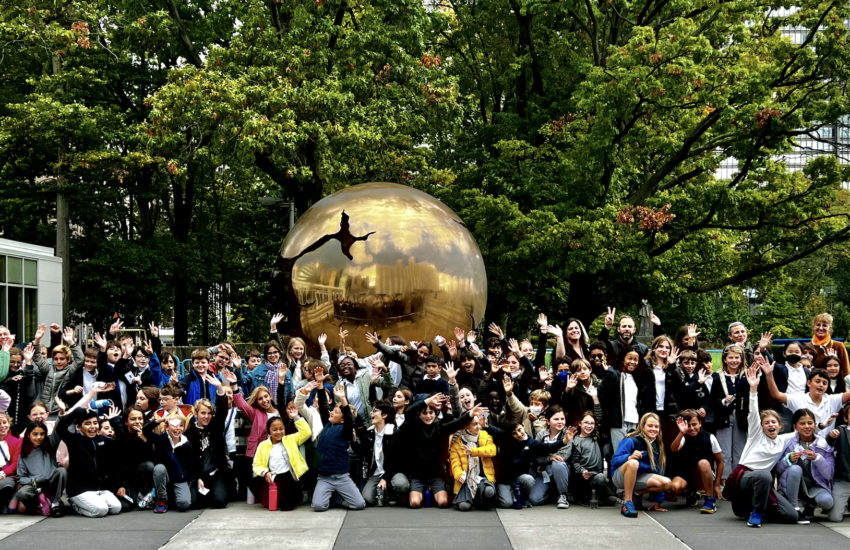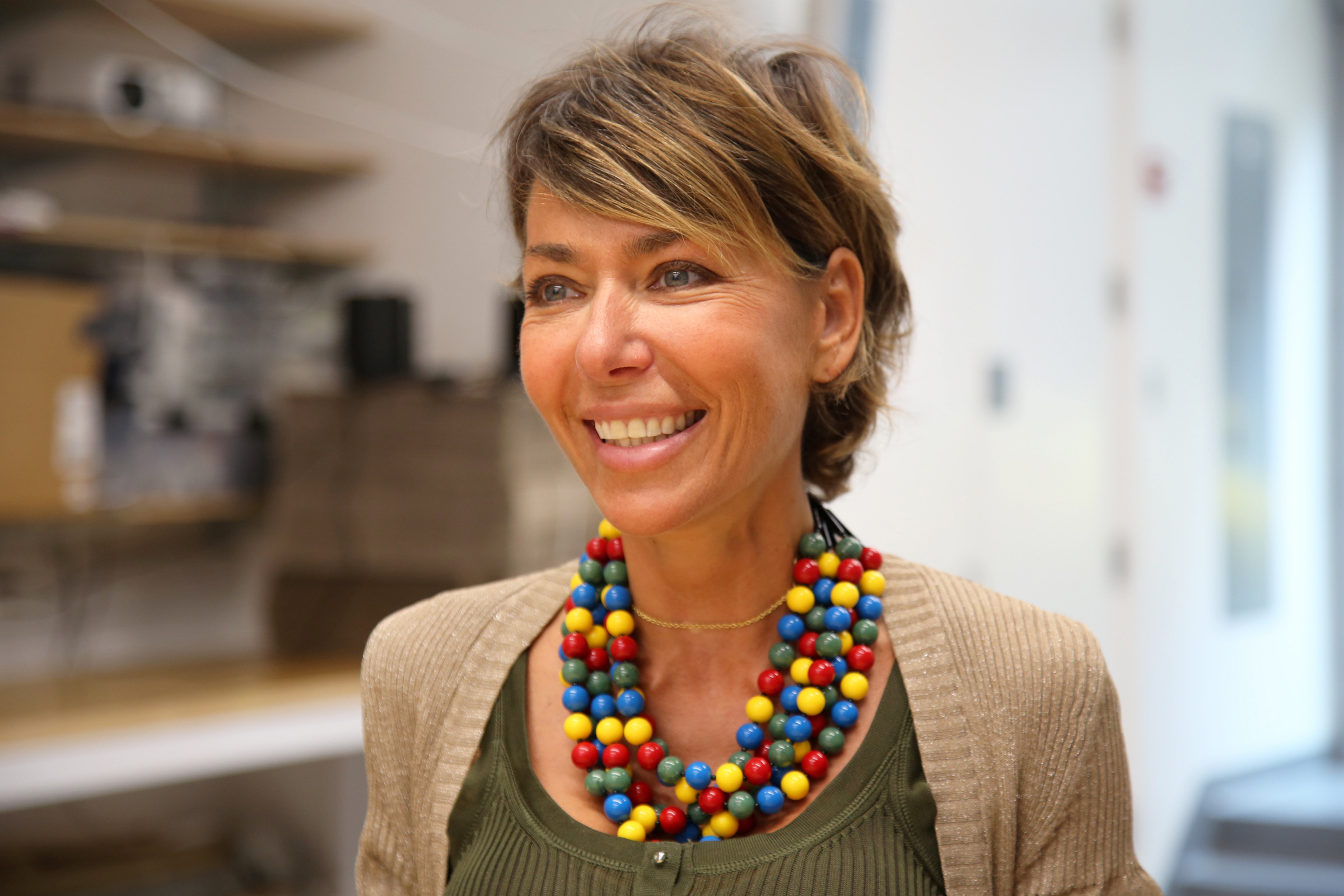On October 17th, the entire fifth grade of the Lycée Français de New York went to the United Nations for the International Day for the Eradication of Poverty.
At the Lycée Français de New York, our conviction is that the future of humanity rests on a respectful and harmonious relationship with all living things, stewardship of the earth’s vast resources, and an embrace of human diversity.
It is our responsibility to educate future generations in the concepts of social justice, peace and preserving our planet. We make this real for our students through learning activities focused on the challenges that lie before us, and the extraordinary opportunity and possibility of the human endeavor. To be a “Citizen of Culture and Courage,” as our mission states, summarizes this ideal.
The power to take action against injustice is part of this work. This engagement can start early on in a child’s schooling, but it must be adapted to their developmental level. To have a lasting impact, it should include guided reflection on its meaning, followed by concrete learning experiences–ideally collaborative student projects that give students the opportunity to problem solve in a real-word context.
Planting the Seed
On Monday, October 17, during the commemoration of the Day for the Eradication of Extreme Poverty, 91 fifth graders and teachers were invited by ATD Quart Monde to visit the UN for an afternoon of speeches and stories told by poverty activists and also people who have experienced life in extreme poverty.
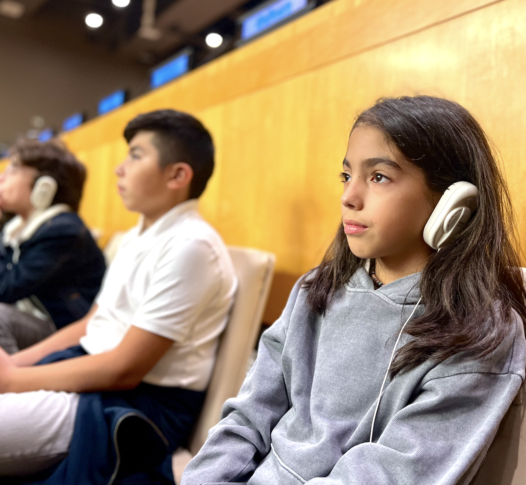 Their stories were hard to hear because of their harshness and the direct confrontation with injustice they represent. At the same time, they show extraordinary hope and optimism, as the speakers shared their stories of how they were able to regain their dignity.
Their stories were hard to hear because of their harshness and the direct confrontation with injustice they represent. At the same time, they show extraordinary hope and optimism, as the speakers shared their stories of how they were able to regain their dignity.
The next day, I went to each fifth-grade homeroom to continue the conversation and provide an opportunity for our students to reflect on their observations. The maturity of the students in our conversations amazed me. The notion of dignity, or rather the loss of dignity, is an idea our students retained when they left the conference, and they talked about it with concern and empathy.
A Fall Project
The essential (or critical) questions that arise from the students from their UN visit are an extraordinary teaching moment. The visit was a starting point for fall projects in the CM2 classes of Alexis Brunel and Camille Jobet, developed using a curriculum shared with the school by the UN. Among the questions the students began to explore are:
- What do we mean when we talk about human rights?
- What is peace?
- Who are the actors of peace, what do you need to do to become one?
Each project included a phase of exploration and research to build knowledge and problem solve; a phase of creativity and brainstorming where students worked together on a project to educate others about what they learned.
In Alexis Brunel’s class, students had a discussion on the meaning of peace and the conditions for peace. They presented their thoughts in clouds, with some beautiful reflections:
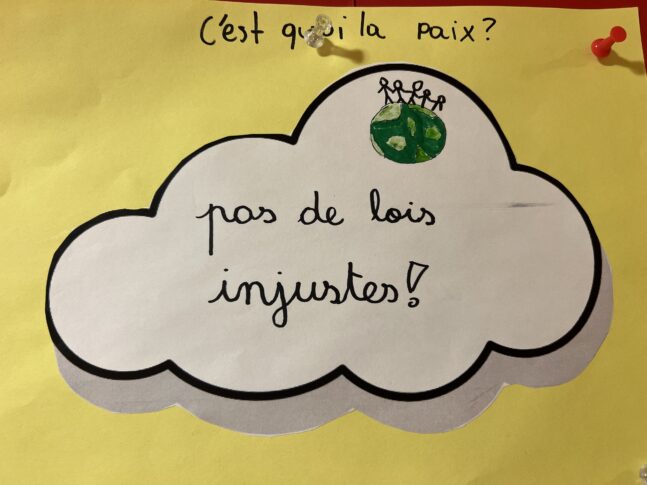
Both classes studied key actors for peace, or “bâtisseurs de la paix,” by exploring winners of the Nobel Peace Prize and examining the injustices they sought to address, including:
Martin Luther King, Jr (1964), U.S., Civil Rights
Rigoberta Menchú (1992), Guatemala, Rights of Indigenous Peoples
Nelson Mandela (1993), South African, End to Apartheid
Malala Yousafazi (2014), Pakistan, Girls Education
Liu Xiobo (2010), China, Human Rights
In Camille Jobet’s class, students also wrote “recipes” for peace, which they recited to their families and classmates during celebrations of Primary School’s Day of Understanding:
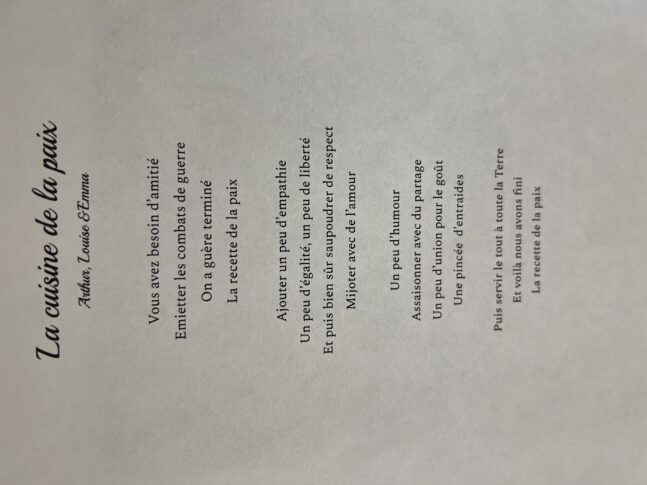
Throughout the project, our teachers helped our students build awareness of what they know, guided them to respond to questions and to think critically and creatively to build a solution.
It’s through this collaborative, reflective work that our students will be able to build for themselves a notion of citizenship, responsible and engaged, “Citizens of culture and courage, at home in the world.”
About the Author :
Vannina Boussouf grew up on the Mediterranean island of Corsica, where bilingualism is an integral part of identity. She studied English and Spanish at the University of Corsica, and philology and letters in Cordoba, Spain, before starting a career as an elementary teacher and administrator. Vannina relocated to the United States in 2004, where she taught at the International School in Louisiana. She joined the Lycée in 2007 to direct the Primary School, and during her tenure, she has focused on innovative teaching methods that support the development of the whole child in a bilingual setting.

